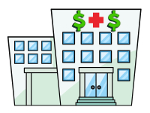
Jonathan Blum, Director of CMS’ Center for Medicare, stated of the data, which comprises over 163,000 individual charges on claims filed to Medicare in fiscal year 2011, “Our purpose for posting this information is to shine a much stronger light on these practices.” More than 3,300 hospitals are represented, with one facility sometimes charging twice a nearby hospital’s rates for the same procedure. Department of Health and Human Services (HHS) Secretary Kathleen Sebelius said in a phone briefing that “These rates can vary dramatically in ways that can’t be easily explained. Even within cities there can be massive variation in what consumers pay.” She also noted, “Currently, consumers don’t know what a hospital is charging them or their insurance company for a given procedure, like a knee replacement, or how much of a price difference there is at different hospitals, even within the same city. This data and new data centers will help fill that gap.”
The charges that were analyzed and posted are from the hospitals themselves and do not include charges made by individual doctors. Examining the data for acute myocardial infarctions (heart attacks) reveals a range in average charges from $7,063 (at Huron Medical Center in Bad Axe, MI) to $210,229 (at Capital Health Medical Center – Hopewell in Pennington, NJ) almost thirty times as much. The same diagnosis-related group (DRG) averaged $15,989 in Newark, OH; $31,174 in Newark, DE; and $107,984 at Newark Beth Israel Medical Center in NJ. And in New York City’s borough of Manhattan, the charges vary from an average of $22,076 at Metropolitan Hospital Center to $101,210 at Lenox Hill Hospital, a mile away.
HHS’ Sebelius noted that “Making this available for free for the first time will save consumers money by arming them with information that can help them make better choices.” However, the database may not be indicative of what a particular insurance carrier pays, nor is it reflective of what Medicare actually reimburses. The hospital industry was quick to point out that the numbers did not signify that a patient would be paying several times more at one hospital than another for the same procedure. Chip Kahn of the Federation of American Hospitals said, “Anybody who is insured, this is not what they ought to worry about… What they need to know is what their out of pocket will be and what their insurance premiums will be.” American Hospital Association president and CEO Richard Umbdenstock stated that “It would create serious antitrust risks for hospitals to share the proposed or negotiated rates with each other. Variation in charges, therefore, is a byproduct of the marketplace so all parties must be involved in a solution, including the government.” Until a consistent method of calculating reasonable and realistic procedure charges is applied across the board, however, the cost of healthcare in the US will remain a top contributor to the federal deficit.
Medical billing software such as Lytec 2013 and Medisoft 18 helps medical practices keep track of charges and payments accurately and efficiently. A Microwize Technology healthcare consultant can answer any questions you might have about these applications and their Electronic Medical Records (EMR) options. Contact us today!

